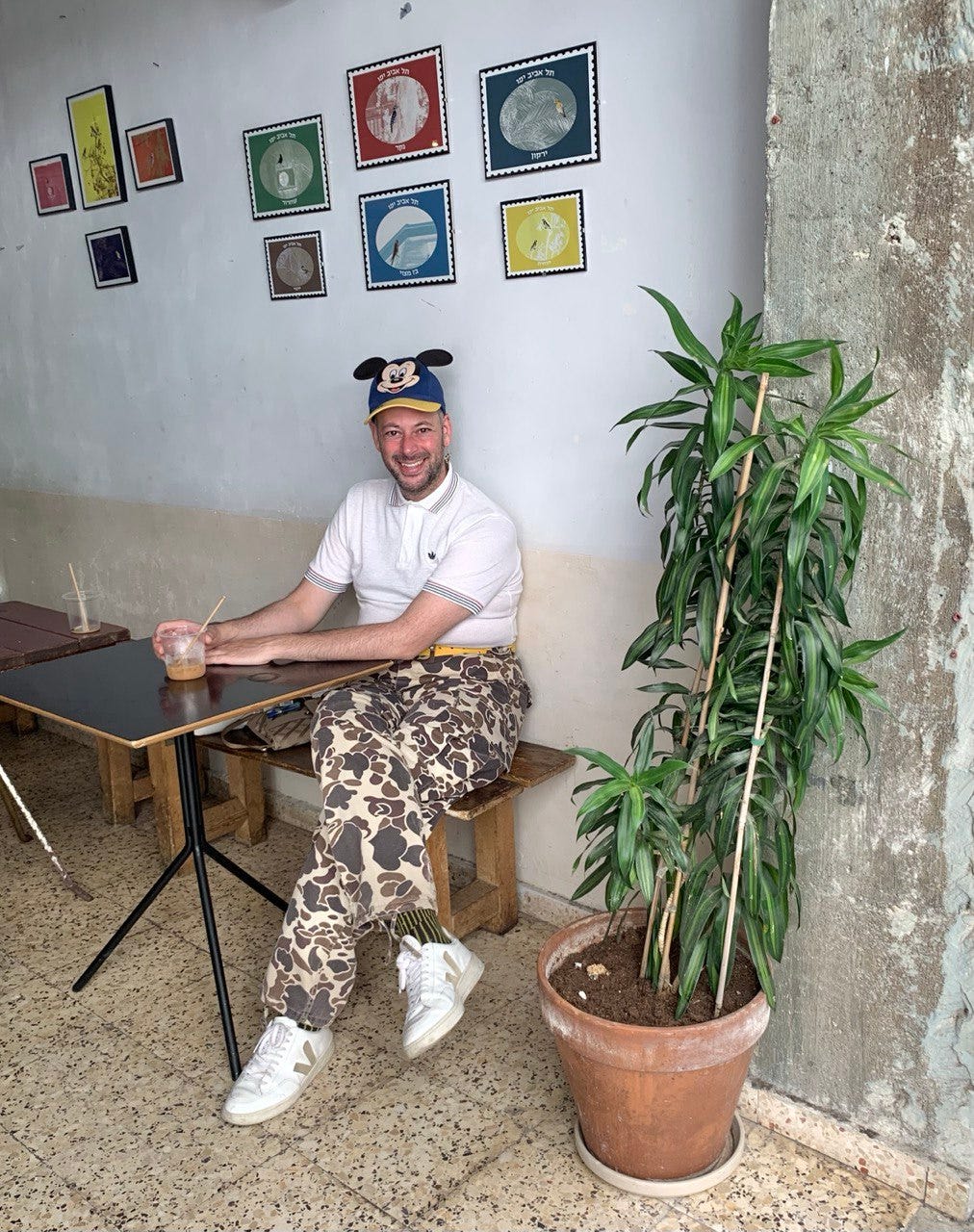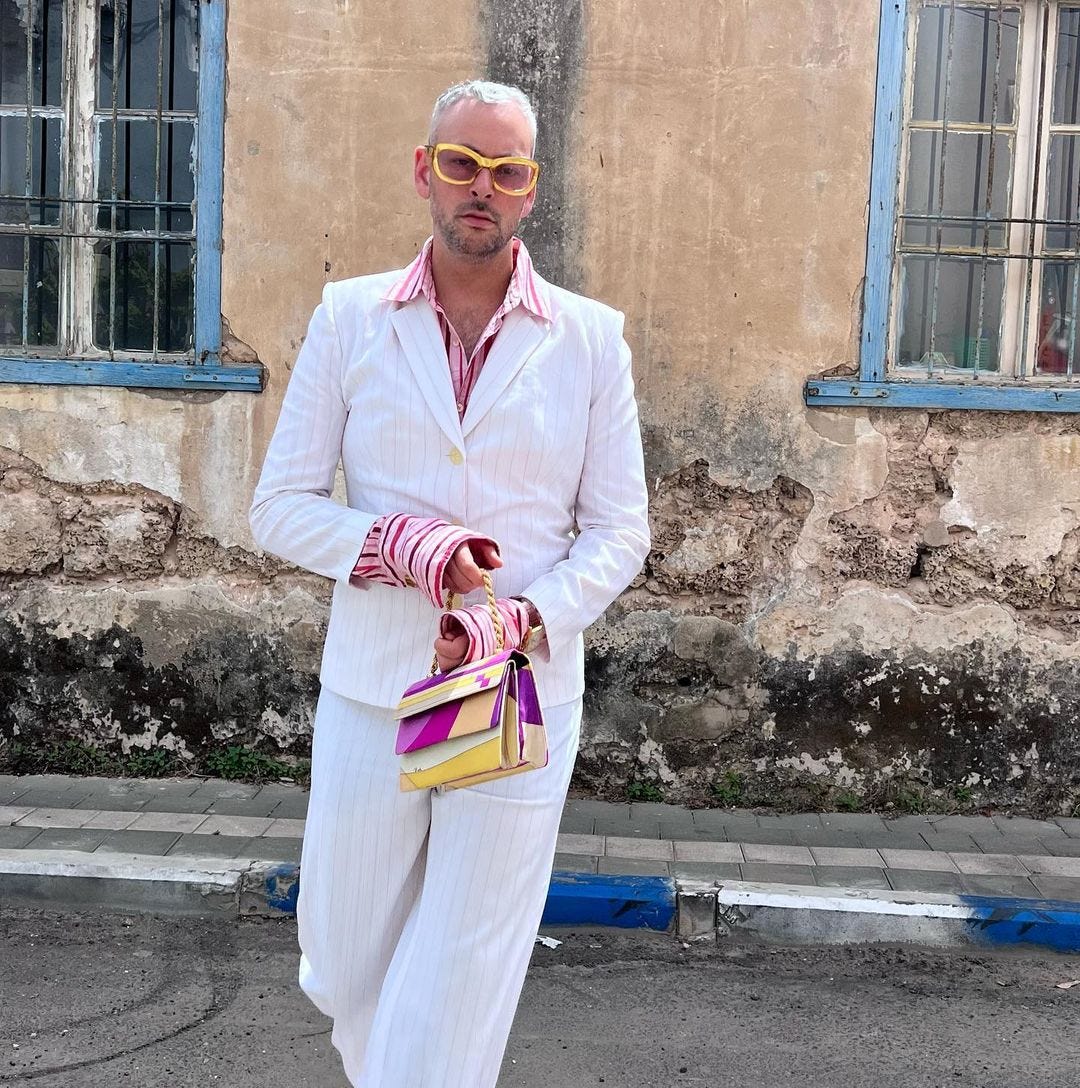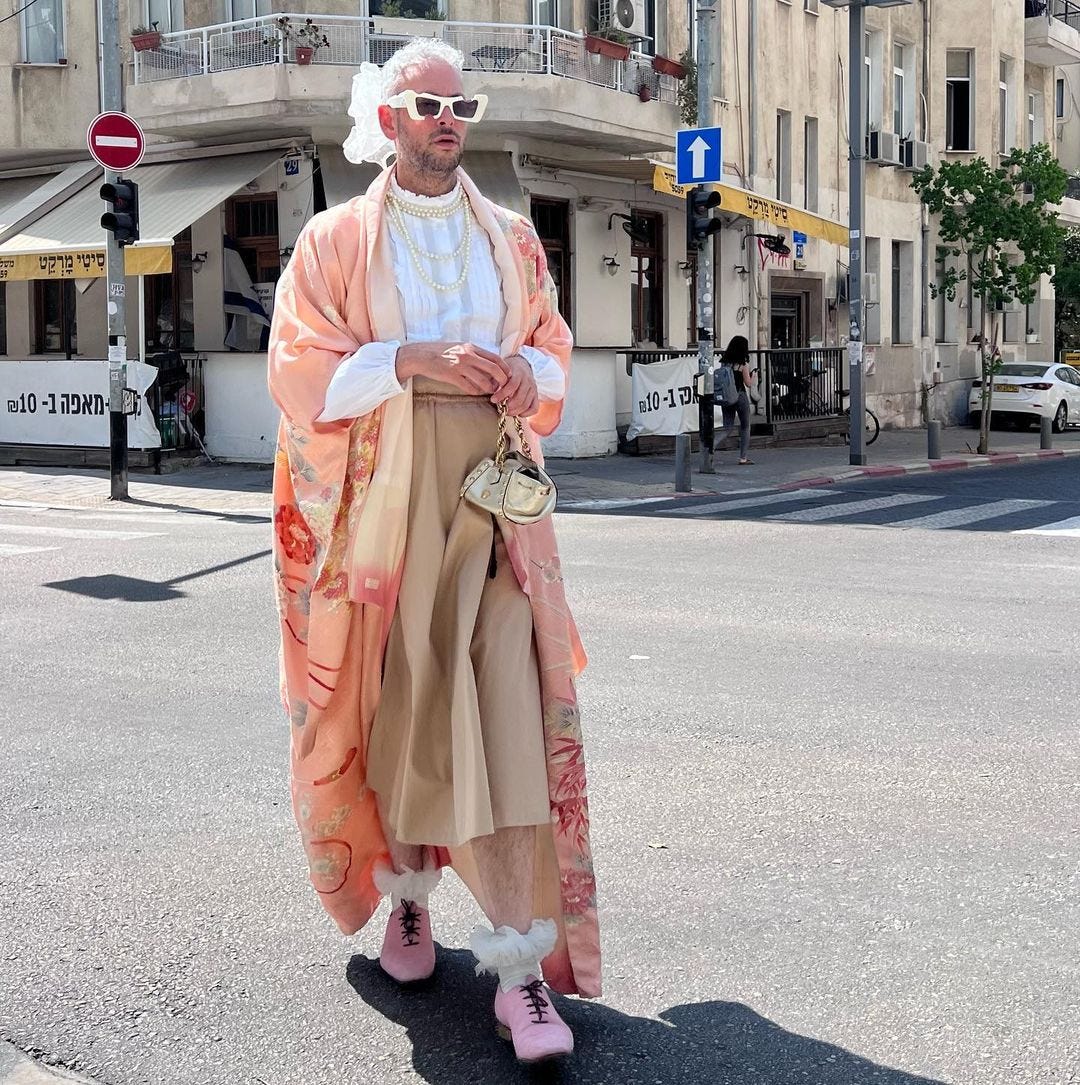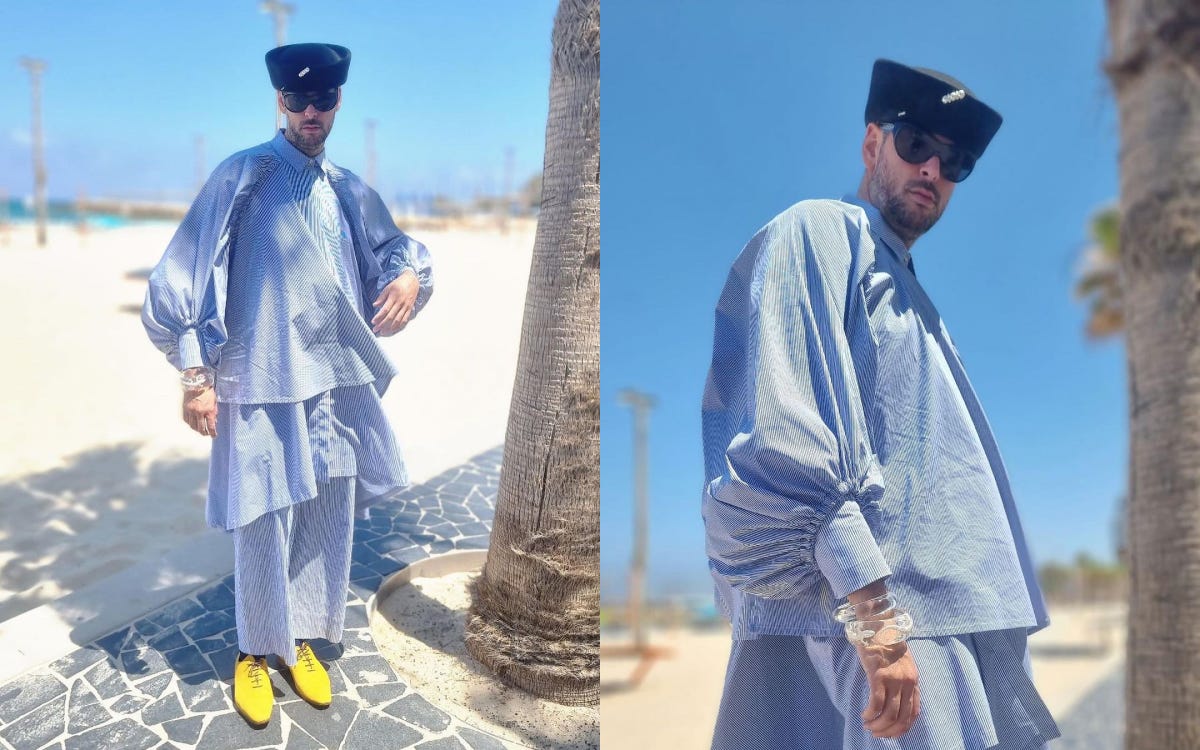Elad Hoffman is vintage-obsessed and you will be too
“When you come to a vintage shop, you can choose your own style. They don't dictate what you should buy”
If you walk around the center of Tel Aviv, you'll notice several vintage and second-hand stores. Before the October 7 attack on Israel, new ones used to open every month. As the city gradually returns to normalcy and the business routine resumes, vintage stores, like other fashion entrepreneurs, are putting in their best efforts to keep their businesses thriving.
If you're searching for vintage in Israel, Elad is the one to look up to. Before October 7, his Vintage Me Up project did an amazing job of popularizing the local vintage scene. Near Levinsky Market, at Ha-Shuk Street 12, with its raw, beautiful energy, this pop-up store had an ambitious concept: for six months (until the end of January), different Israeli vintage stores would showcase their selections here, involving about fifty participants from every part of the country.
Several weeks into the war, Elad's project, among others, aimed to assist the community: providing support for evacuees and opening the store to raise donations for residents of South Israel affected by the attack. When you visited the store, the man behind the project was often present, greeting customers, helping them choose pieces, and capturing photos for his Instagram—all at once.
Now, Elad is taking a moment of rest after his significant vintage fashion event. Originally scheduled for October, it had to be canceled due to the war but was eventually held on December 21-23 at the Simtat Shlush 19 community center in Tel Aviv—an established hub for local fashion brands and enthusiasts. “I think that in the shadow of war, we realized how much power we have, how much everyone wants to help each other and give, how important it is to support small Israeli businesses. That's exactly why I chose to hold the event at this time.”—he wrote on his Instagram.
Elad Hoffman, 33, always dressed in the best of his vintage treasures, has been involved in the vintage world for years, organizing tours and planning markets, researching and collecting from vintage spots in Israel and around the world. His three-hour vintage tours (which can be booked via a link on his Instagram) are fully booked a month in advance, with over 500 people already having participated and left over 120 rave reviews. Elad's boundless energy demands your attention, and it seems that much of the vintage scene in Israel is inspired and driven by his efforts.
When we talked in September at a coffee house near the pop-up store, Elad arrived wearing a Mickey Mouse hat and a Mickey-themed earring, paired with camouflage pants, a vintage Adidas polo shirt, and Veja sneakers. One could say that this look is relatively modest for him; on his Instagram, he can get quite bold, wearing colorful dresses and skirts and inspiring everyone to try something new and discover aspects of themselves they didn't even know were within them. When you look at him, it's hard to believe him when he tells you he grew up in Haifa, where the only fashion he could access was from magazines.
How did the idea of the pop up come about?
There are a lot of pop-ups in Tel Aviv. I knew I wanted to do a pop-up, so I talked with other shops a lot, and I felt that I wanted to bring in all of them. So for half a year, I was planning to bring two stores a week because I want every store to have the opportunity to show their collection. And I really want people here to enjoy all the vintage pieces.
Do you work alone, or do you have a team?
I work alone.
You do it all alone, handling all the interactions and organizing—wow!
Yeah, it's a lot. But this is what I love, this is my passion. So when I do it, I do it with a lot of love and respect for other people. And the clothing, of course!
How did you determine what to bring?
I did a lot of research. For three years, I traveled around the country—sometimes every week, sometimes twice a week.
Can you describe your customers?
I offer all kinds of vintage pieces: Y2K, 90s, 80s, accessories, jewelry. So the customers are diverse as well. You have a lot of young people looking for Y2K items, and a lot of people looking for one-pieces, 90s items, t-shirts, or even Levi's jeans. I feel that Y2K fashion has made a comeback.
Do you think that vintage is as popular in Israel as it is in Europe?
Not yet. In Israel, everything arrives a little later. But it's growing. All over the world, especially in Europe and the US, vintage fashion is incredibly popular. And I feel that after the pandemic, people appreciate the experience of leaving home and seeing all the clothes, touching the fabrics, and really feeling them. I sense that the younger generation—teenagers and kids alike—understand vintage and talk about it within their school communities and with their parents. There's more discussion about it, which is great.
This is why I change it up every week—to offer everyone a different style. Vintage is just כולל שם, it’s more than just a label; it encompasses items from the 70s, 60s, 80s, and the Y2K era. I can’t say that any particular group of people prefers a specific style. People in general love change. So, I want to provide all of them with the opportunity to enjoy a diverse range of vintage items.
Do people come in looking for outfits for weddings or bar mitzvahs?
Yes, but they aren’t looking for anything flashy or, you know, poppy, like from the 80s or the 2000s. Weddings are more casual these days. I feel it's not like it used to be in the past. Nowadays, they are searching for something different, something more casual, even youthful.
On your Instagram, you discuss how vintage is still stigmatized for many people.
Yeah, but I think this is changing. When people shop for secondhand items, it often appears messy or dirty. So, when I opened this pop-up, I designed the interiors to look like a boutique. It doesn't look like a typical secondhand store. I also tell the shop owners to clean and steam everything so people can see it's genuinely unique, high-quality pieces that look like new. You're essentially buying a new outfit, new clothes. It's no different from shopping at a regular store.
If the world stopped producing clothing, you would have enough clothing for, I don't know, 30 or 50 years? I feel that right now, it's different from 5-10 years ago because every media outlet talks about sustainability, quality, and the importance of dressing in vintage. It's also nice when you have a unique item. When you come to a vintage shop, you can choose your own style. They don't dictate what you should buy, you know?
Do you see that something inside the customers' minds is changing as they come and browse?
Yeah, of course. This is why I conduct the vintage tours, to assist people in finding items. Since everything is unique and one-of-a-kind, in just one size, I know the styles well, and I try on the clothes all the time. I always encourage people to try things on; it's okay to not buy.
Tell me about the vintage tours and markets that you conduct. What sets these activities apart?
Here at the pop-up, there are only two stores showing at the same time. At the market, there are many stores in one place. There, you search for garments on your own, while at the pop-up, you receive a lot of help; it's a really personal and intimate experience.
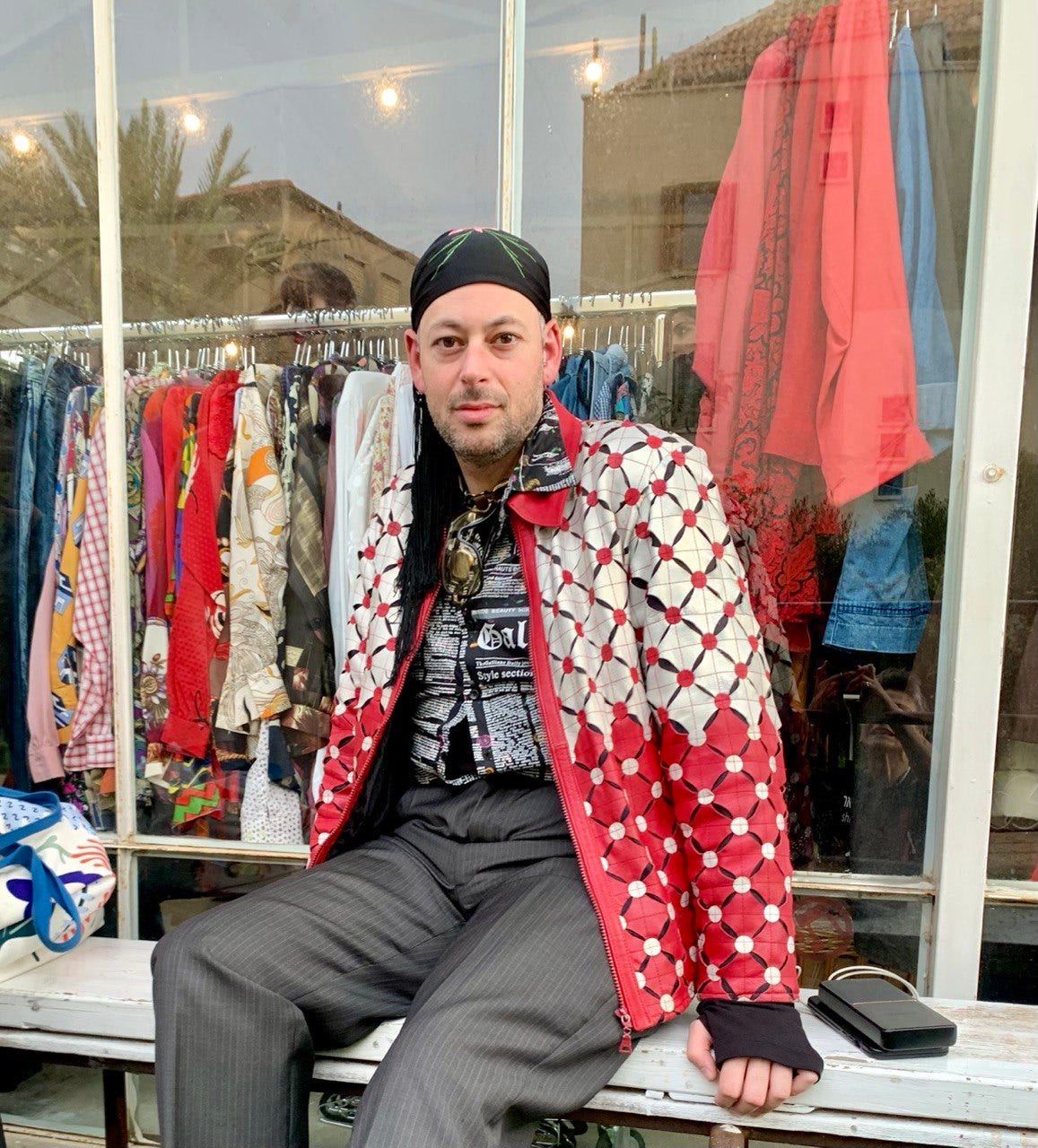
What is true for all the vintage activities I engage in is that everyone can find something, whether it's for 50 shekels or 300 shekels. However, the setup is different. At the pop-up, you get the owners’ or my full attention, while at the market, there are many people and the attention you receive is not as deep. I enjoy doing both because sometimes you want to be the only customer in the store, and at the market, you encounter different styles and personalities. Here, you might take a pair of jeans, there a top, or a hat, and you can collect the pieces you like.
The same goes for my vintage tours. You pick up items here and there, and I show you the best shops because not everyone can navigate this type of search in the city. Some shops are tucked away in small streets, but they are wonderful shops. It's amazing when you can collect great pieces as you go. During the tour, I bring you to the best shops, and then you can return to them by yourself whenever you want.
I've noticed that good fashion in Tel Aviv needs to be discovered.
Tel Aviv is large, and it has many secondhand and vintage shops. So, every tour is different, depending on the group and the specific moment. It can be more focused on vintage or more on secondhand. Some people have more money to spend, while others don't want to spend a lot, but they still want to buy clothes.
Where do the vintage items in your store come from? Are there any that were created in Israel?
I have a collection of vintage pieces from Israeli brands. On my Instagram, I showcase many of the vintage pieces I have. Namely, Gottex (an Israeli swimwear brand founded in the 60s— J.V.), ATA (the first company in Israel to manufacture and design textiles locally, founded in 1934— J.V.), and Maskit (an Israeli fashion house founded in 1954— J.V.).
However, vintage here is mostly imported from other countries because in Europe and the US, there are more people and more clothing. Fashion in other countries is older, whereas in Israel, it only began to develop in the 50s. Israel experienced numerous wars, and the country was still in the process of being built.
Can you tell me a bit about yourself and how you entered the world of fashion?
I've loved fashion all my life. I was just afraid to pursue it. I hadn't come out of the closet as gay and was afraid to be myself. When I finally came out, I felt more like myself, not afraid of people laughing at me or saying things to me. I felt stronger. My family told me it's a tough industry because you need to stand out and do something different from others.
I started by working for Razili (an Israeli womenswear brand founded in 1990— J.V.), but I quickly realized that I wanted to work in the vintage space because I truly enjoy it. I find it unique, colorful, and joyful. I took a risk to pursue it. I work hard to make people understand that when you buy clothing, you're not just purchasing a garment; you're acquiring a piece of art. You're buying something unique, and that's what interests me. I feel that fashion is what’s saving me in this world because when I get up, get dressed, and talk about my work, it brings me joy and success. It's something that makes me very happy.
Elad on Instagram: eladhoffman
5 short questions for Elad Hoffman:
Where to eat in Tel Aviv?
Taqueria. I love Mexican food.
What's your favorite secret spot in Tel Aviv?
Tel Aviv is constantly changing, and I always discover new spots. Like yesterday, I found a new vintage store in Gan HaHashmal that I didn’t know about!
Which vintage pieces are the bestsellers in terms of category?
I love bringing in jeans or pants; it brings me joy when they fit, and I see how people become obsessed with them.
Favorite month in Tel Aviv?
November.
What advice would you give to yourself ten years ago?
Believe in yourself.




